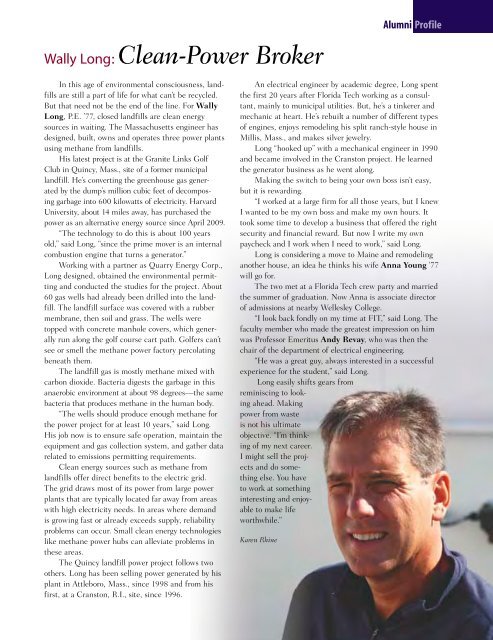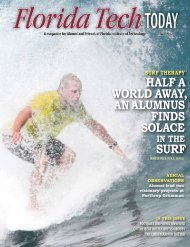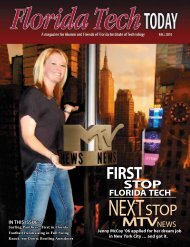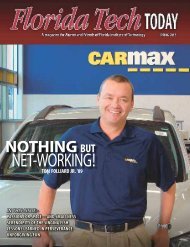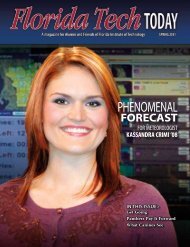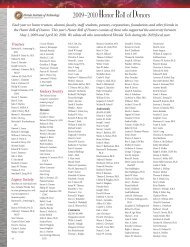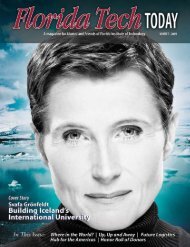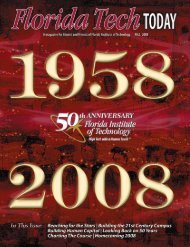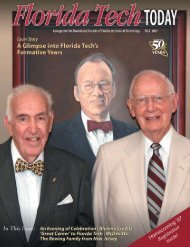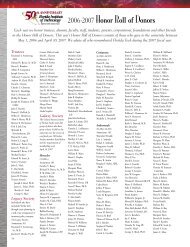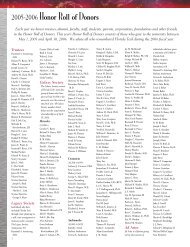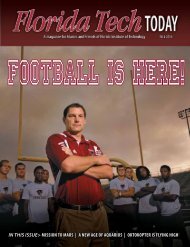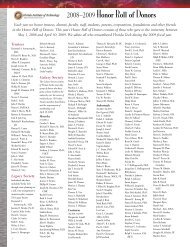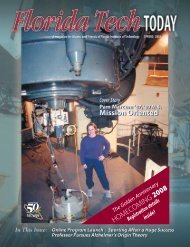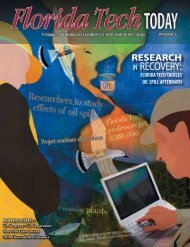Fall 2009 - Florida Tech Today - Florida Institute of Technology
Fall 2009 - Florida Tech Today - Florida Institute of Technology
Fall 2009 - Florida Tech Today - Florida Institute of Technology
Create successful ePaper yourself
Turn your PDF publications into a flip-book with our unique Google optimized e-Paper software.
Wally Long: Clean-Power Broker<br />
In this age <strong>of</strong> environmental consciousness, landfills<br />
are still a part <strong>of</strong> life for what can’t be recycled.<br />
But that need not be the end <strong>of</strong> the line. For Wally<br />
Long, P.E. ’77, closed landfills are clean energy<br />
sources in waiting. The Massachusetts engineer has<br />
designed, built, owns and operates three power plants<br />
using methane from landfills.<br />
His latest project is at the Granite Links Golf<br />
Club in Quincy, Mass., site <strong>of</strong> a former municipal<br />
landfill. He’s converting the greenhouse gas generated<br />
by the dump’s million cubic feet <strong>of</strong> decomposing<br />
garbage into 600 kilowatts <strong>of</strong> electricity. Harvard<br />
University, about 14 miles away, has purchased the<br />
power as an alternative energy source since April <strong>2009</strong>.<br />
“The technology to do this is about 100 years<br />
old,” said Long, “since the prime mover is an internal<br />
combustion engine that turns a generator.”<br />
Working with a partner as Quarry Energy Corp.,<br />
Long designed, obtained the environmental permitting<br />
and conducted the studies for the project. About<br />
60 gas wells had already been drilled into the landfill.<br />
The landfill surface was covered with a rubber<br />
membrane, then soil and grass. The wells were<br />
topped with concrete manhole covers, which generally<br />
run along the golf course cart path. Golfers can’t<br />
see or smell the methane power factory percolating<br />
beneath them.<br />
The landfill gas is mostly methane mixed with<br />
carbon dioxide. Bacteria digests the garbage in this<br />
anaerobic environment at about 98 degrees—the same<br />
bacteria that produces methane in the human body.<br />
“The wells should produce enough methane for<br />
the power project for at least 10 years,” said Long.<br />
His job now is to ensure safe operation, maintain the<br />
equipment and gas collection system, and gather data<br />
related to emissions permitting requirements.<br />
Clean energy sources such as methane from<br />
landfills <strong>of</strong>fer direct benefits to the electric grid.<br />
The grid draws most <strong>of</strong> its power from large power<br />
plants that are typically located far away from areas<br />
with high electricity needs. In areas where demand<br />
is growing fast or already exceeds supply, reliability<br />
problems can occur. Small clean energy technologies<br />
like methane power hubs can alleviate problems in<br />
these areas.<br />
The Quincy landfill power project follows two<br />
others. Long has been selling power generated by his<br />
plant in Attleboro, Mass., since 1998 and from his<br />
first, at a Cranston, R.I., site, since 1996.<br />
An electrical engineer by academic degree, Long spent<br />
the first 20 years after <strong>Florida</strong> <strong>Tech</strong> working as a consultant,<br />
mainly to municipal utilities. But, he’s a tinkerer and<br />
mechanic at heart. He’s rebuilt a number <strong>of</strong> different types<br />
<strong>of</strong> engines, enjoys remodeling his split ranch-style house in<br />
Millis, Mass., and makes silver jewelry.<br />
Long “hooked up” with a mechanical engineer in 1990<br />
and became involved in the Cranston project. He learned<br />
the generator business as he went along.<br />
Making the switch to being your own boss isn’t easy,<br />
but it is rewarding.<br />
“I worked at a large firm for all those years, but I knew<br />
I wanted to be my own boss and make my own hours. It<br />
took some time to develop a business that <strong>of</strong>fered the right<br />
security and financial reward. But now I write my own<br />
paycheck and I work when I need to work,” said Long.<br />
Long is considering a move to Maine and remodeling<br />
another house, an idea he thinks his wife Anna Young ’77<br />
will go for.<br />
The two met at a <strong>Florida</strong> <strong>Tech</strong> crew party and married<br />
the summer <strong>of</strong> graduation. Now Anna is associate director<br />
<strong>of</strong> admissions at nearby Wellesley College.<br />
“I look back fondly on my time at FIT,” said Long. The<br />
faculty member who made the greatest impression on him<br />
was Pr<strong>of</strong>essor Emeritus Andy Revay, who was then the<br />
chair <strong>of</strong> the department <strong>of</strong> electrical engineering.<br />
“He was a great guy, always interested in a successful<br />
experience for the student,” said Long.<br />
Long easily shifts gears from<br />
reminiscing to looking<br />
ahead. Making<br />
power from waste<br />
is not his ultimate<br />
objective. “I’m thinking<br />
<strong>of</strong> my next career.<br />
I might sell the projects<br />
and do something<br />
else. You have<br />
to work at something<br />
interesting and enjoyable<br />
to make life<br />
worthwhile.”<br />
Karen Rhine<br />
Alumni<br />
Pr<strong>of</strong>ile<br />
<strong>Florida</strong> <strong>Tech</strong> TODAY | 33


